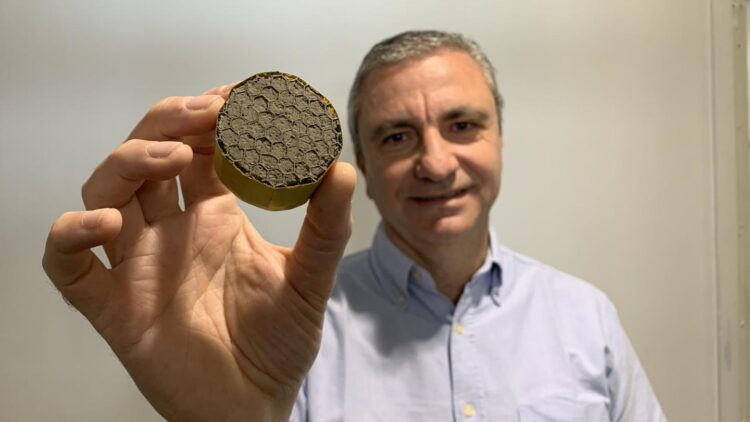Extremely low-density graphene-based aerogel ‘meringue’ can improve passenger comfort and reduce noise up to 80%
An incredibly light new material that can reduce aircraft engine noise and improve passenger comfort has been developed at the University of Bath.
The graphene oxide-polyvinyl alcohol aerogel weighs just 2.1kg per cubic metre, making it the lightest sound insulation ever manufactured. It could be used as insulation within aircraft engines to reduce noise by up to 16 decibels – reducing the 105-decibel roar of a jet engine taking off to a sound closer to that of a hair-dryer.
The aerogel’s meringue-like structure makes it extremely light, meaning it could act as an insulator within aircraft engine nacelles, with almost no increase in overall weight. The material is currently being further optimised by the research team to offer improved heat dissipation, offering benefits to fuel efficiency and safety.
Researchers from Bath’s Materials and Structures Centre (MAST) have published a method for manufacturing the materials in the journal Nature Scientific Reports.
Professor Michele Meo, who led the research, says: “This is clearly a very exciting material that could be applied in a number of ways – initially in aerospace but potentially in many other fields such as automotive and marine transport, as well as in building and construction.
“We managed to produce such an extremely low density by using a liquid combination of graphene oxide and a polymer, which are formed with whipped air bubbles and freeze-casted. On a very basic level, the technique can be compared with whipping egg whites to create meringues – it’s solid but contains a lot of air, so there is no weight or efficiency penalty to achieve big improvements in comfort and noise.”
Although the team’s initial focus is in working with partners in aerospace to test the material as a sound insulator in aeroplane engines, they say it could also be used to create panels in helicopters, or car engines. They estimate that the aerogel could be in use within 18 months.
###
Images are available at: https:/
For more information or to request interviews, contact Will McManus on 01225 385798 or at [email protected] or [email protected]
University of Bath
The University of Bath is one of the UK’s leading universities both in terms of research and our reputation for excellence in teaching, learning and graduate prospects.
The University is rated Gold in the Teaching Excellence Framework (TEF), the Government’s assessment of teaching quality in universities, meaning its teaching is of the highest quality in the UK.
In the Research Excellence Framework (REF) 2014 research assessment 87 per cent of our research was defined as ‘world-leading’ or ‘internationally excellent’. From developing fuel efficient cars of the future, to identifying infectious diseases more quickly, or working to improve the lives of female farmers in West Africa, research from Bath is making a difference around the world. Find out more: http://www.
Well established as a nurturing environment for enterprising minds, Bath is ranked highly in all national league tables. We are ranked 6th in the UK by The Guardian University Guide 2021, and 9th in both The Times & Sunday Times Good University Guide 2021 and the Complete University Guide 2022. Our sports offering was rated as being in the world’s top 10 in the QS World University Rankings by Subject in 2021.
Media Contact
Will McManus
[email protected]
Original Source
http://www.
Related Journal Article
http://dx.





